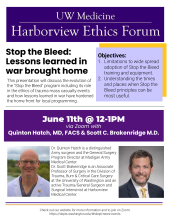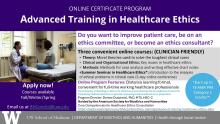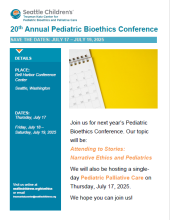Event
Bioethics Minor students - join us for our virtual welcome back event!
HMC Ethics Forum | “The Ones We Can’t Fix”: Using Structural Competency to Think About Hard Ethics Cases
Join us on Wednesday, October 8th @ 12PM with Sara Kolmes, PhD, HEC-C, for a discussion of “The Ones We Can’t Fix”: Using Structural Competency to Think About Hard Ethics Cases.
HMC Ethics Forum | Justice and Equity: Attending to Silenced Voices in Ethics
Join us on Wednesday, September 10th @ 12PM with Arika Moore Patneaude, MSW, LICSW, APHSW-C for a discussion of "Justice & Equity: Attending to Silenced Voices in Ethics."
Through analyzing the practice of land acknowledgments, this presentation seeks to inspire ethicists to acknowledge the harm of impartiality as a core concept of justice. Through engaging in self-reflection, examination of, and interrogation of the justice principle that ethics as a field can elevate silenced, marginalized, and excluded voices.
Stop the Bleed: Lessons learned in war brought home | HMC Ethics June Forum
Please join us on Wednesday, June 11th with Quinton Hatch, MD, FACS & Scott C. Brakenridge M.D.
This presentation will discuss the evolution of the "Stop the Bleed" program including its role in the ethics of trauma mass casualty events and how lessons learned in war have hardened the home front for local programming.
Leaving the bedside to mend the bedside: Revising HHS Consent Guidelines | HMC Ethics May Forum
Please join us on Wednesday, May 14th with Lori Bruce, MA, MBE, DBe, HEC-C!
This talk will discuss a bio-ethicist's paradigm of integrating community voices within policy. We will discuss case examples which reduced clinicians' moral distress and amplified patient values and preferences.
OBJECTIVES:
Two More Weeks of Early Bird Pricing for Our Summer Seminar
Just two more weeks until registration costs go up for our Summer Seminar!
Get the early bird pricing while its still available, $100 off registration costs until May 15th.
Scholarships and group discounts are available. Details and registration information can be found here: https://shorturl.at/HU8Vb
Applications Open for the Advanced Training in Healthcare Ethics Certificate Program
Advance your career with healthcare ethics!
Applications are open for the Advanced Training in Healthcare Ethics certificate program offered by UW Medicine's Department of Bioethics & Humanities.
20th Annual Pediatric Bioethics Conference
Join Seattle Children's for the 20th Annual Pediatric Bioethics Conference from July 17th-19th.
The presentation will be on Attending to Stories: Narrative Ethics and Pediatrics. They will also be hosting a single-day Pediatric Palliative Care on Thursday, July 17, 2025.
Legal Considerations for Critically Ill and Dying Patients Who Lack Surrogate Decision Makers | HMC Ethics April Forum
Please join us on Wednesday, April 9th with an expert-led panel discussion.
This presentation will discuss the legal framework that guides processes for ensuring that a patient’s interests are represented when determining whether to withhold or withdraw life-sustaining treatment.









